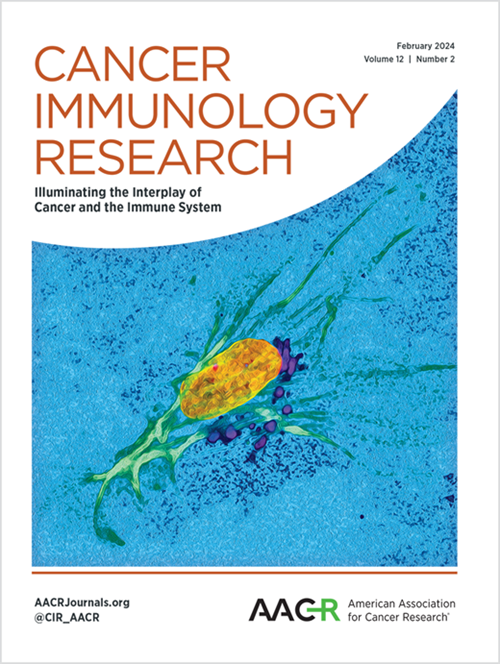PTPRZ1 靶向 RNA CAR T 细胞在胶质母细胞瘤中发挥抗原特异性和旁观者抗肿瘤活性
IF 8.1
1区 医学
Q1 IMMUNOLOGY
引用次数: 0
摘要
嵌合抗原受体(CAR)T细胞疗法在治疗B细胞恶性肿瘤患者方面取得了巨大成功,这促使它被应用于实体瘤的治疗。就胶质母细胞瘤(GBM)而言,临床试验显示疗效一般,但开发更有效的抗胶质母细胞瘤 CAR T 细胞的工作仍在进行中。在这项研究中,我们选择了 PTPRZ1 作为治疗 GBM 的靶点。我们从人类噬菌体展示文库中分离出了六种抗人类 PTPRZ1 scFv,并以 RNA 格式制备了第二代 CAR T 细胞。我们使用患者来源的 GBM PTPRZ1 基因敲入细胞系来选择既能显示高细胞毒性又能持续显示高 CAR 表达的 CAR 构建物(471_28z)。含有 471_28z 的 CAR T 细胞能够释放 IFN-γ、IL-2、TNF-α、Granzyme B、IL-17A、IL-6 和可溶性 FasL,并显示出低强直信号。此外,它们在体外杀伤后保持了效应记忆表型。此外,471_28z CAR T 细胞在被 PTPRZ1 阳性肿瘤细胞预激活后,对 PTPRZ1 阴性细胞系有很强的旁观者杀伤作用,但对抗原阴性的非肿瘤细胞没有杀伤作用。在使用 NSG 小鼠的正位异种移植肿瘤模型中,单剂量抗 PTPRZ1 CAR T 细胞可显著延缓肿瘤生长。总之,这些结果验证了 PTPRZ1 是一种 GBM 靶点,并促进了抗 PTPRZ1 CAR T 细胞的临床转化。本文章由计算机程序翻译,如有差异,请以英文原文为准。
PTPRZ1-targeting RNA CAR T cells exert antigen-specific and bystander antitumor activity in glioblastoma
The great success of chimeric antigen receptor (CAR) T-cell therapy in the treatment of patients with B-cell malignancies has prompted its translation to solid tumors. In the case of glioblastoma (GBM), clinical trials have shown modest efficacy, but efforts to develop more effective anti-GBM CAR T cells are ongoing. In this study, we selected PTPRZ1 as a target for GBM treatment. We isolated six anti-human PTPRZ1 scFv from a human phage display library and produced 2nd generation CAR T cells in an RNA format. Patient-derived GBM PTPRZ1-knock-in cell lines were used to select the CAR construct that showed high cytotoxicity while consistently displaying high CAR expression (471_28z). CAR T cells incorporating 471_28z were able to release IFN-γ, IL-2, TNF-α, Granzyme B, IL-17A, IL-6, and soluble FasL, and displayed low tonic signaling. Additionally, they maintained an effector memory phenotype after in vitro killing. In addition, 471_28z CAR T cells displayed strong bystander killing against PTPRZ1-negative cell lines after pre-activation by PTPRZ1-positive tumor cells but did not kill antigen-negative non-tumor cells. In an orthotopic xenograft tumor model using NSG mice, a single dose of anti-PTPRZ1 CAR T cells significantly delayed tumor growth. Taken together, these results validate PTPRZ1 as a GBM target and prompt the clinical translation of anti-PTPRZ1 CAR T cells.
求助全文
通过发布文献求助,成功后即可免费获取论文全文。
去求助
来源期刊

Cancer immunology research
ONCOLOGY-IMMUNOLOGY
CiteScore
15.60
自引率
1.00%
发文量
260
期刊介绍:
Cancer Immunology Research publishes exceptional original articles showcasing significant breakthroughs across the spectrum of cancer immunology. From fundamental inquiries into host-tumor interactions to developmental therapeutics, early translational studies, and comprehensive analyses of late-stage clinical trials, the journal provides a comprehensive view of the discipline. In addition to original research, the journal features reviews and opinion pieces of broad significance, fostering cross-disciplinary collaboration within the cancer research community. Serving as a premier resource for immunology knowledge in cancer research, the journal drives deeper insights into the host-tumor relationship, potent cancer treatments, and enhanced clinical outcomes.
Key areas of interest include endogenous antitumor immunity, tumor-promoting inflammation, cancer antigens, vaccines, antibodies, cellular therapy, cytokines, immune regulation, immune suppression, immunomodulatory effects of cancer treatment, emerging technologies, and insightful clinical investigations with immunological implications.
 求助内容:
求助内容: 应助结果提醒方式:
应助结果提醒方式:


